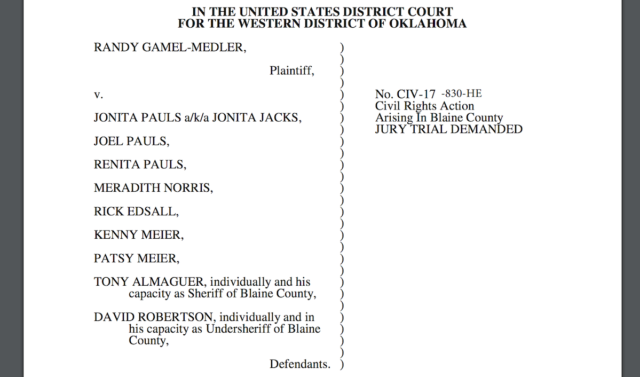A civil rights lawsuit filed in U.S. District Court on Thursday contains some of the most heinous allegations of hate crimes one could imagine.
Additionally, because the lawsuit claims that Blaine County Sheriff’s Office agents ignored the alleged crimes, the suit stands as a stark reminder that court systems play a critical role in protecting human rights and adjudicating the sort of he-said, he-said allegations that can be difficult to dissect.
Oklahoma — and the 120-person town of Hitchcock, in particular — has already made national news for the alleged events detailed in the suit.
The Associated Press’s Sean Murphy first wrote about the lawsuit over the weekend, speaking to both the plaintiff, Randy Gamel-Medler, and one of nine defendants, Blaine County undersheriff Dave Robertson.
From the AP:
When Randy Gamel and his husband were looking for a retirement home, a six-bedroom fixer upper in the tiny western Oklahoma town of Hitchcock caught their eye.
They bought it in 2014, and Gamel moved to the quiet community from Fort Worth, Texas, to start upgrades. He set out to make himself a part of the agricultural community of a little more than 100 residents. He befriended neighbors, took an interest in town politics and soon became the town clerk.
But it wasn’t long before Gamel began feuding with longtime locals over how the town should be run. Many town leaders and employees are related, and Gamel says he has a reputation for speaking up, vociferously, when he sees a problem. The local sheriff from the nearby county seat of Watonga was soon being called to the town routinely to settle disputes involving Gamel and other townsfolk.
Tension erupted in flames in May when a suspicious fire ripped through Gamel’s home, burning the two-story structure to the ground.
Gamel’s suit alleges that the fire was set intentionally May 28 — an event he says was foreshadowed and even threatened by Hitchcock town leaders with whom he had clashed.
“While Plaintiff’s house was burning, Patsy Meier sat on one side of the house watching, Kenny Meier was on the other side watching, Joey Pauls was in the alley watching, and the Mayor and his family were in their lawn chairs watching,” the suit alleges.
The Meiers, Joey Pauls, JoNita Pauls (his daughter), Renita Pauls (his wife) and others are named for alleged harassment of Gamel, a white adoptive father of a seven-year-old black son.
The suit includes graphic language, some of which NonDoc has chosen to place asterisks in (sic):
In early May, 2017, the Plaintiff was performing his duties as Town Clerk in attempting to remove an obstruction to a right of way when he was assaulted by Jonita Pauls Jacks (a convicted felon) who, while Plaintiff was in the performance of his duties, came up to Plaintiff’s truck, tried to enter the truck, and when Plaintiff locked the door, started shaking the truck. Jonita Pauls Jacks called Plaintiff a “f***ing queer. I’m going to grab your little boy, rip his n****r head off, and shit down his throat.”
The suit alleges that Renita Pauls doubled down on that statement, telling Gamel in front of law enforcement: “Which part of that is not right? You’re a queer aren’t you?” The suit says she repeated the threat about throat-shitting.
Courts offer protections to both parties
According to the AP, Gamel acknowledged that “before moving to Oklahoma, his criticism of staff and teachers at his son’s Fort Worth elementary school became so heated that district officials prohibited him last year from visiting the school.”
The AP also reported that Robertson, the undersheriff, said while the feuds between Gamel and others were real, the fire may have started in a different manner than Gamel claims. He also called Gamel a bully.
“I got to know him very well from all the complaints and allegations that he made, and I cannot find one person who made any racist statements against his child or against him for being a homosexual,” Robertson said. “We don’t take too kindly to being called racist and homophobic, because we’re not.”
While this is the sort of lawsuit that will polarize many observers along political and social lines, it also serves as a good reminder that courts operate — in theory — to protect the rights of all parties and the public.
If, in fact, Gamel was so shunned and persecuted that law enforcement personnel would not grant him the protections offered under law, then Gamel’s suit affords him with at least the hope that comes with public attention on a situation.
On the other hand, defendants must be considered innocent until proven guilty, something the court will require at any trial.
Without the court, neither party would have the protections it deserves.
Read the lawsuit as filed
https://nondoc.com/wp-content/uploads/2017/08/Gamel-Medler.pdf” height=”450px”]





















